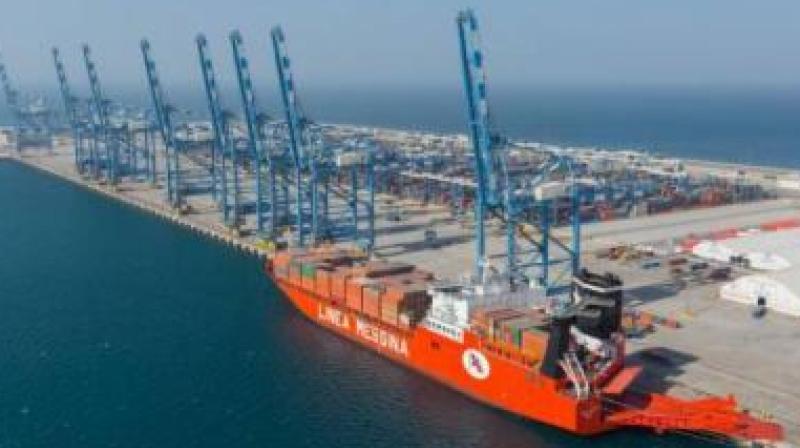Ready to share details of CPEC debts with IMF for bailout: Pakistan
IMF MD Lagarde has made it clear that IMF would require transparency on Pak's debts, including those owned by China under CPEC.

Islamabad: Pakistan is ready to share details of the debt related to the China-Pakistan Economic Corridor (CPEC) with the IMF, Finance Minister Asad Umar has said while rejecting the US' view that China-funded projects were to blame for the cash-strapped country's current economic woes.
Speaking to the media here on his return from Indonesia where he requested International Monetary Fund's Managing Director Christine Lagarde for a bailout package for Pakistan, Umar said the decision to approach the global lender was taken after consultations with friendly countries.
The IMF team, Umar said, was scheduled to arrive in Pakistan on November 7 to negotiate the programme, likely to span over a three-year period.
He said Pakistan's current year debt repayments were about USD 9 billion but obviously it would not entirely be available from the IMF.
Lagarde has made it clear that the IMF would require absolute transparency on Pakistan's debts, including those owned by China under the USD 50 billion CPEC. Umar, however, rejected the US State Department's statement, suggesting that the debt accrued on the CPEC projects was to blame for Pakistan's current economic crisis.
The US Friday said that the huge Chinese debt was responsible for the economic challenges in Pakistan, adding that it will review Islamabad's bailout plea to the IMF from all angles, including the country's debt position.
"We understand that Pakistan has formally requested assistance from the IMF. In all cases, we examine that closely from all angles of it, including Pakistan's debt position, in evaluating any type of loan programme," State Department spokesperson Heather Nauert had said, adding this is something the US has been tracking fairly closely.
Responding to a question, Nauert said; "The secretary (of state Mike Pompeo) had spoken about this a few months back, I know, in some interviews not that long ago. I think part of the reason that Pakistan found itself in this situation is Chinese debt, and the fact that there is debt that governments have incurred that they maybe thought wouldn't be so tough to bail themselves out of, but has become increasingly tough."
Umar said the US was a key stakeholder in the IMF with about 16.5 per cent votes but enjoyed no veto power in its decision making that required majority 51 per cent votes. He said no government in Pakistan irrespective of any political background could compromise on national security and the Pakistan Tehreek-e-Insaf government, too, would not opt for an IMF programme if conditionalities are of that nature.
But Umar Saturday said the government will have to take difficult decisions that would be painful for people but necessary under international commitments to get out of the current severe economic situation.
The IMF, Umar said, had asked for details of loans, including ones secured in relation to the CPEC projects, for analysing the debt sustainability.
Pakistan would share "normal debt-related information about CPEC with the IMF", the Express Tribune Sunday quoted the finance minister as saying.
Reiterating that the government had decided to approach the Fund in consultation with friendly countries, he said that talks with these countries were still underway. He did not identify these countries but Islamabad was in contact with China and Saudi Arabia in recent weeks.
Unlike 2013, said the minister, the global environment was not favourable to Pakistan that was why the government thoroughly deliberated upon this matter before approaching the IMF.
He said that Pakistan was facing a financing gap of USD 12 billion this year, adding that this gap would not be bridged by IMF alone. "We will turn to friendly countries again if the IMF terms are unacceptable to Pakistan during talks on the programme," he asserted.
The minister said that he had been contending for quite some time that economic conditions could lead to national security issues and the government would not compromise on matters of national security.
He also said that Saudi Arabia, China and the United Arab Emirates had not placed tough conditions for bailing Pakistan out. But he declined to cite specific reasons why these countries had not provided any financial assistance to Pakistan, the report said.
Categorically rejecting the US assertion that the country was in an economic mess because of the CPEC-related debt repayments, Umar said that over the next three years, such repayments amounted to just USD 300 million a year, which "is very nominal against USD 9 billion of total debt repayments payable during this fiscal year alone".
The "statement of state department spokesperson is 100 per cent wrong", the minister said explaining that Pakistan's financing gap for the current year was about USD 12 billion and total repayments to China averaged USD 300 million over the next three years.
“We totally disagree with that statement,” Umar said, adding that he had already explained this to the US representatives and also to the IMF chief.
"The American narrative is totally wrong narrative,” Umar was quoted as saying by the Dawn. Without disclosing exact numbers, Umar said Pakistan's net foreign currency reserves were far below than the current gross level of USD 8.3 billion.
The minister said that one of the reasons for widening current account deficit was an increase in crude oil prices. He acknowledged that the IMF programme would impact the lower and middle-income groups in Pakistan. "We can perhaps live without the IMF but this could be more painful," Umar added.

